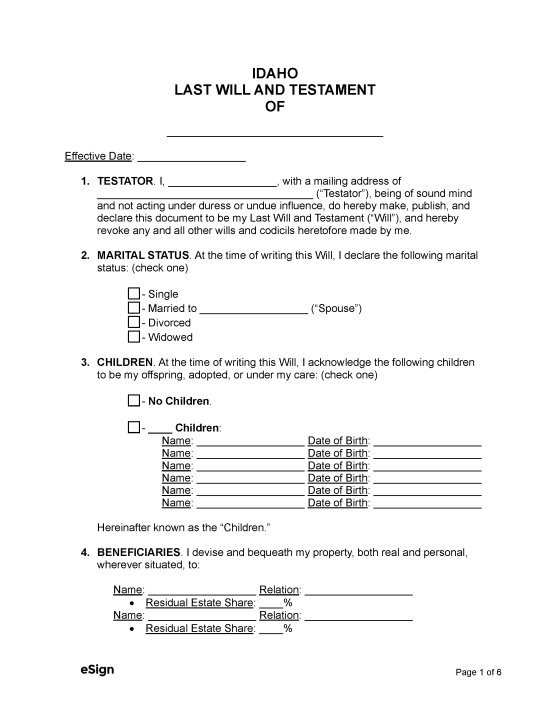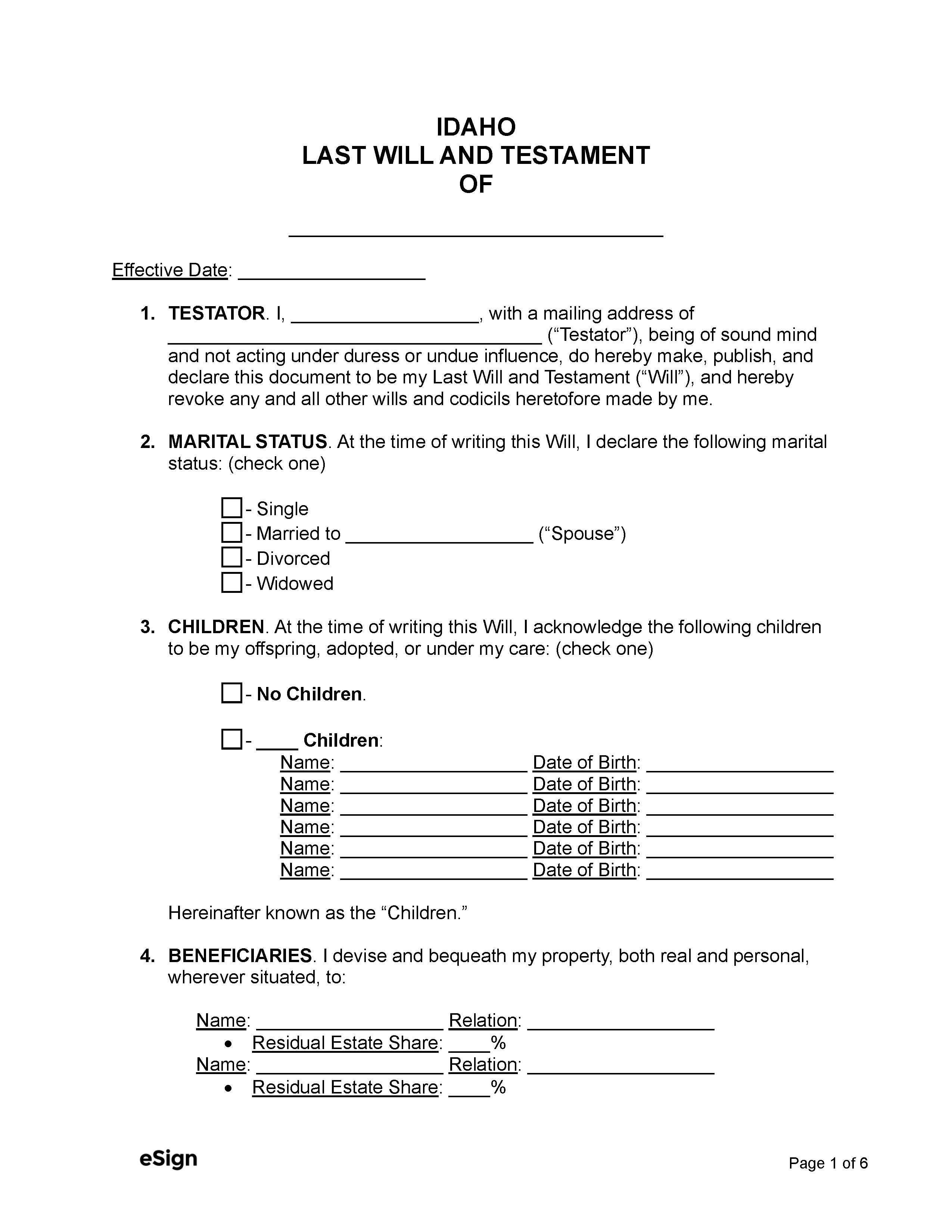State Laws
Any person who is 18 or older or an emancipated minor can make a will.[1]
Holographic Wills – If a will is made in the testator’s handwriting and has their signature, witnesses are not required for it to be valid.[2]
Revocation – The testator can revoke an existing will by executing a new will that revokes the previous will in whole or part or by destroying the document.[3] If the testator divorces their spouse, any spousal disposition or appointment will be automatically revoked.[4]
Signing Requirements – To be valid, a will must be signed by the testator and two witnesses.[5]
Probate Process in Idaho (8 steps)
Within a reasonable period of time after a person’s death, their will should either be delivered to an individual who can open its probate (often the will’s executor) or filed with the county court.[6]
- Application for Informal Probate
- Statement of Informal Probate & Letters Testamentary
- Bond (If Applicable)
- Notices
- Estate Inventory
- Paying Decedent’s Debts
- Distributing the Estate
- Closing the Estate
1. Application for Informal Probate
The decedent’s estate can bypass probate altogether by completing and notarizing an Affidavit for Collection of Personal Property if the following criteria are met[7]:
- 30 days have passed since the decedent’s death.
- The estate’s value does not exceed $100,000.
- There is no pending or granted appointment of a representative or summary administration.
- The estate doesn’t include real estate.
When probate is required, the will can usually pass through informal probate. Unlike formal probate, the informal option doesn’t require court appearances.
The process begins when an interested party, in most cases, the executor named in the will, must complete an Application for Informal Probate and Appointment of a Personal Representative and Acceptance of Appointment. Both documents and a copy of the will must be filed in the county court where the decedent last resided.[8]
Notice of Informal Probate
After submitting the Application for Informal Probate, the executor will be required to deliver a notice of their application to any of the decedent’s active personal representatives and interested parties that requested notification of the will’s probate.[9]
2. Statement of Informal Probate & Letters Testamentary
If five days have passed since the decedent’s death, and if the application is approved, the court will execute and issue a Statement of Informal Probate and Letters Testamentary to open probate and authorize the executor to administer the estate.[10]
4. Notices
Notice of Appointment
Within 30 days of receiving Letters Testamentary, the executor must mail notice of their appointment to the decedent’s legal heirs and named beneficiaries. The notice needs to include the executor’s name and address, indicate that the receiver has an interest in the estate of the personal representative, relay whether a bond has been filed, and a description of the court where the probate documents are filed.[13]
Notice to Creditors
The executor must provide a Notice to Creditors. There are two ways for them to complete this requirement:
- Publish the notice in a local newspaper for three consecutive weeks.
- Deliver the notice to any known creditors.
The notice informs creditors they must present their claim within 4 months of the date of publication, or 60 days of the delivery date, whichever is later.[14]
5. Estate Inventory
The executor must prepare and file with the court an inventory of all assets in the decedent’s estate within three months of being given Letters Testamentary and file it with the court. The inventory will need to list all of the decedent’s property and their approximate market value.
Copies of the inventory must be sent to any parties that requested service.[15]
6. Paying Decedent’s Debts
Once the time limit for creditors to present claims has passed, the executor can begin using estate funds to pay off all valid cases.[16]
The order for payment of claims is as follows[17]:
- Administration costs
- Funeral expenses
- Decedent’s debts and taxes with preference under federal law
- Final medical and hospital expenses
- Decedent’s debts and taxes with preference under state law
- All other claims
The executor will also be responsible for filing the decedent’s final tax returns and federal estate taxes (if applicable). Any taxes owed must be paid out of the estate.
7. Distributing the Estate
After paying the decedent’s debts and taxes, the estate’s remaining assets can be distributed in accordance with the will. Each beneficiary must sign and return a Receipt and Release after receiving their distribution, which the executor will then file with the court.
If any beneficiary refuses to sign a Receipt and Release, the executor will be required to complete and file an Accounting with the court that lists administration costs, payments, and distributions. Otherwise, the requirement is waived.
8. Closing the Estate
After six months have passed since their appointment and they have completed all of the steps listed above, the executor can file a Verified Statement of Personal Representative Closing Estate. Copies of the statement must be sent to all the decedent’s beneficiaries and creditors.
The executor’s appointment as administrator will terminate one year after the closing statement is filed if there are no pending court proceedings.[18]

